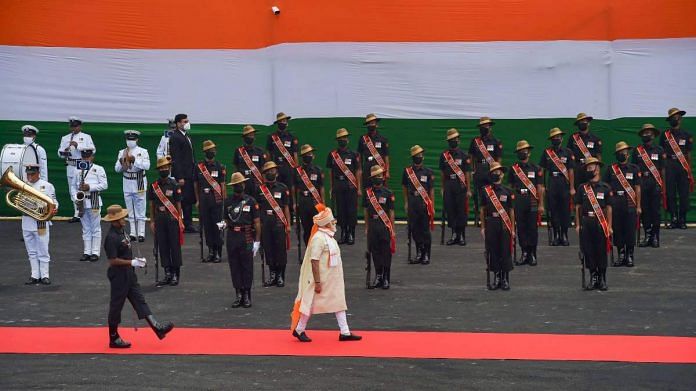New Delhi: The National Digital Health Mission, that Prime Minister Narendra Modi announced Saturday in his Independence Day address, is envisioned as the first step towards Universal Health Coverage.
A digital health ecosystem will be put in place, complete with a personal health ID for every Indian, identifiers for doctors and health facilities and personal health records. All of this will be accessible through an app or a website with the health records “ownership” lying with the individual, as ThePrint had been the first to report on 23 July.
To be led by the National Health Authority that is also the administrative authority for the Pradhan Mantri Jan Arogya Yojana, the Rs 144 crore National Digital Health Mission (NDHM) will need all government health programmes, such as Ayushman Bharat and the tuberculosis programmes, to integrate with it and issue health IDs to beneficiaries.
While the health ID is not mandatory, the government is hoping that the feature will attract more users to it since it allows a person online access to all their health records right from birth. There will be an option of the ID being linked to Aadhaar but it will not be mandatory unless the person wants to avail of any government subsidy scheme.
Also read: Govt moves to digitise health records quickly, asks states to send data but ensure privacy
Pilots to start by month end
According to its strategy document, the NDHM’s vision is: “To create a national digital health ecosystem that supports universal health coverage in an efficient, accessible, inclusive, affordable, timely and safe manner, that provides a wide-range of data, information and infrastructure services, duly leveraging open, interoperable, standards- based digital systems, and ensures the security, confidentiality and privacy of health-related personal information.”
In its first phase, the mission will pilot in Andaman & Nicobar Islands, Chandigarh, Dadra & Nagar Haveli and Daman & Diu, Lakshadweep, Ladakh and Puducherry. According to the original schedule, this was supposed to have started before the prime minister’s announcement, but there is a slight delay now and officials are hoping to get it off the block by the end of August.
The strategy document that was approved some time back says: “Phase 2 will be taking forward the pilot in additional States and expand the service bouquet. Phase 3 will target nation-wide roll-out, operationalizing and converging with all health schemes across India along with promotion, on-boarding, and acceptance of NDHM across the country.”
Safety and privacy of health data
Theoretically, health data is generated every time a doctor writes a prescription, every time an individual self medicates and every time the person undergoes a diagnostic test. Most of this data currently either exists in cumbersome and poorly kept files by patients, is not recorded or simply lost. The mission will require doctors/hospitals to upload a digital copy of any health reports being physically shared with the patient to enable creation of longitudinal health records.
“NDHM will implement a federated health records exchange system that will enable patient data to be held at point of care or at the closest possible location to where it was created. Health records will be accessible and shareable by the patient with appropriate consent and complete control of the records will remain with the patient,” says the strategy document.
“An appropriate digital consent framework as per standards specified by NDHB (leveraging DigiLocker consent management framework to the extent possible) will be adopted for consent management,” it further outlines.
The document categorises health data into three distinct layers.
Electronic Medical Records (EMR) — This refers to systems that are used within a hospital or a clinic to support patient diagnosis and treatment and are transaction focused. NDHM requires these systems to be updated to support standards and provide access to patients’ data.
Electronic Health Records (EHR) — EHRs contain records for a patient across multiple doctors and providers and is used within a Healthcare system (like say across a state government) to provide better care for patients.
Personal Health Records (PHR) — PHRs enable patients to compile, update and keep a copy of their own records that can help them better manage their care and are person focussed.
It will not be possible to have access to digital health records without creation of a health ID.
Governance structure
The mission will keep two separate arms, according to the National Digital Health blueprint. One arm will be for regulation and other for implementation and operational management. The Mission Steering Group, under the chairpersonship of the Union health minister, will oversee and guide the NDHM. Its members will include ministers of women and child development, social justice and empowerment, AYUSH and information technology, the principal scientific advisor, Member Health (NITI Aayog), secretaries of health, expenditure and information technology, the National Health Authority (NHA) CEO and others.
An Empowered Committee will be set up under the chairpersonship of the health secretary, that will take necessary policy-level decisions, help the mission with coordination with different stakeholders and engagement with different ministries and departments to ensure their participation. Its members will include NITI Aayog CEO, secretaries of women and child development, social justice & empowerment, MeitY, AYUSH, and expenditure as well as NHA CEO and directors general of health services and the National Informatics Centre.
Also read: There’s a rush for Covid medical insurance but the cover comes with a catch



